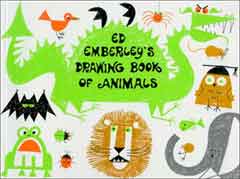You are here: Teaching Helps > General Education > Teach Tips Approaches
Ed Emberley books
by Diane Lilleberg

Ed Emberley's Drawing Book of Animals
Ed Emberley is a Caldecott Medal artist whose how-to books are the kind adults buy for children and then use themselves. On the dedication page of his animal drawing book there is a picture of the author as a little boy with the inscription, “For the boy I was, the book I could not find.”
There are three titles that I often recommend.
Whenever parents see one of them, they purchase it. The books provide a lot of fun for everyone in the family in settings where fun is sometimes hard to come by or when dressing up curriculum is difficult to do without the stimulation of other ideas. They show how to draw objects step-by-step. Under each step, Emberley illustrates the shapes that are used to extend the drawing. Just continue left to right, and there you have it!
While these books are only a preamble for more “serious” art, they are fun and useful for anyone, whether creating invitations, cards, and finger puppets. Not only are they a great preparation for more formal treatments such as the Mark Kistler books, they can be used for all ages through high school. Even preschoolers will benefit. These books provide a medium to build their small muscle skills. Just require that their drawing tools are held correctly and set them loose! The left to right orientation of the steps will be good exercise, too. My three favorites are listed below:
![]() Ed Emberley’s Drawing Book of Animals,
Ed Emberley’s Drawing Book of Animals,
![]() Ed Emberley’s Drawing Book—Make a World,
Ed Emberley’s Drawing Book—Make a World,
This title is a child’s dream book, showing how to draw over 400 things—“enough things to make a world of your own.” If you can draw a Y or a 3, ![]() and a ∆, O, and
and a ∆, O, and ![]() , you are ready to go. Added touches make it fun. You can draw a car, add a passenger, show the trunk open, make it go the other way, show the front view, add different kinds of trailers, and even give it a flat tire or make it go really fast. You can create buildings, people in action, boats, trees, flags...all sorts of things. The back of the book makes suggestions for doing things with the pictures including comic strips, posters, books, cards, letters, and games. These drawings are smaller than those in the other books, so children can illustrate a world as the title suggests. Just show the book to children, and you see their faces light up before they do anything. They naturally want to use it to work out their own ideas and can find almost anything they want to include.
, you are ready to go. Added touches make it fun. You can draw a car, add a passenger, show the trunk open, make it go the other way, show the front view, add different kinds of trailers, and even give it a flat tire or make it go really fast. You can create buildings, people in action, boats, trees, flags...all sorts of things. The back of the book makes suggestions for doing things with the pictures including comic strips, posters, books, cards, letters, and games. These drawings are smaller than those in the other books, so children can illustrate a world as the title suggests. Just show the book to children, and you see their faces light up before they do anything. They naturally want to use it to work out their own ideas and can find almost anything they want to include.
More books by Ed Emberley:
 Ed Emberley’s Great Thumbprint Drawing Book
Ed Emberley’s Great Thumbprint Drawing Book Ed Emberley’s Fingerprint Drawing Book
Ed Emberley’s Fingerprint Drawing Book Ed Emberley's Complete Funprint Drawing Book
Ed Emberley's Complete Funprint Drawing Book Ed Emberley’s Big Orange Drawing Book
Ed Emberley’s Big Orange Drawing Book Ed Emberley's Big Green Drawing Book
Ed Emberley's Big Green Drawing Book Ed Emberley's Big Purple Drawing Book
Ed Emberley's Big Purple Drawing Book Ed Emberley's Big Red Drawing Book
Ed Emberley's Big Red Drawing Book Ed Emberley's Drawing Book of Trucks and Trains
Ed Emberley's Drawing Book of Trucks and Trains Ed Emberley’s Picture Pie: A Circle Drawing Book
Ed Emberley’s Picture Pie: A Circle Drawing Book Ed Emberley's Drawing Book of Weirdos
Ed Emberley's Drawing Book of Weirdos

Porcupine
Permission to copy, but not for commercial use.
